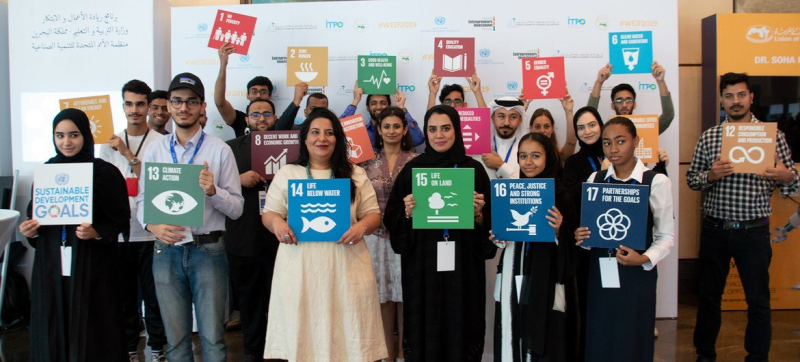- Myanmar Faces War, Disasters, Hunger, and Mass Displacement |
- UN Warns Israeli Doha Strike Risks Regional Escalation |
- Nepal protesters' families seek justice amid confusion |
- Next polls in Feb "foundational” to set future course of BD |
- Fuel oil crisis hits 5 N districts as Rangpur depots run dry |
South-South Cooperation Seen as Path to Fairer World

Youth participating in the Global Forum for Entrepreneurs and Investment hold Sustainable Development Goals 17
Although developing countries often look to wealthy nations for deals to boost their economies, working closely with States facing similar challenges – so-called South-South cooperation – may be the key to sustainable growth and the transformational change needed to achieve global development goals.
In practical terms, South-South cooperation is a process whereby developing countries – regardless of their actual geographical location – pursue individual or shared development goals through the exchange of knowledge, skills, and resources in partnerships involving governments, regional organisations, civil society, academia, and the private sector.
The experiences and goals of most countries in what is known as the Global South intersect as they continue to chart their post-colonial future and strive to meet the development needs of their people.
To support these efforts, the UN established the UN Office for South-South Cooperation (UNOSSC) in 1974, providing backing on the international stage and within the UN system.
Ahead of the International Day for South-South Cooperation, marked on 12 September, UNOSSC Director Dima Khatib told UN News that countries of the South – home to 80 per cent of the world’s population – possess vast untapped human and natural resources and tremendous potential to drive development forward.
“We believe that countries in the Global South not only have challenges but also have solutions and innovations, and we must support, encourage, and highlight their pioneering role in these areas,” she said.
Still, challenges are real and daunting: rising geopolitical tensions, debt burdens, a widening digital divide, and social complexities, all unfolding as humanitarian and development funding from developed countries declines.
This harsh landscape is motivating developing countries to seek financing by cooperating more closely with each other.
Ms. Khatib pointed to recent studies conducted by her office showing that South-South cooperation can change the economic equation, create jobs, and build local capacity in countries ranging from Ethiopia to Paraguay and Rwanda.
In the Middle East, results are visible in renewable energy, digital transformation, and climate change adaptation. For example, Morocco’s experience with large-scale solar farms has become a model for renewable energy projects in parts of sub-Saharan Africa.
Ms. Khatib noted that Gulf countries are not only providing financial support in times of crisis but have also become leaders in sharing expertise.
She highlighted Saudi Arabia’s sharing of its extensive seawater purification experience with drought-affected countries and Masdar City in the United Arab Emirates, which develops research and capabilities that benefit the Global South.
She also credited the Islamic Development Bank as a key driver of progress, facilitating knowledge exchange among its 57 member states and supporting advanced irrigation, sustainable agriculture, and climate-resilient infrastructure.
Ms. Khatib said countries in the Global South are not only coming together but also showing leadership, citing the India-UN Development Partnership Fund and the India-Brazil-South Africa Fund, both hosted by UNOSSC.
She stressed that this demonstrates the power of collective action and sends a strong message that cross-border cooperation is both possible and effective.
Amid today’s tense international political climate, South-South cooperation can be a driving force for renewing and strengthening multilateralism, though it is not a replacement for cooperation among all nations.
The UN official concluded that there can be no divide between the Global North and South: “We must build bridges,” she said – a task to which the UN is well suited, given its mandate to treat all countries equally.

